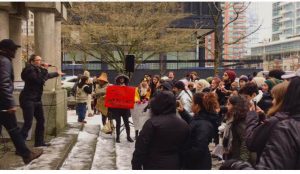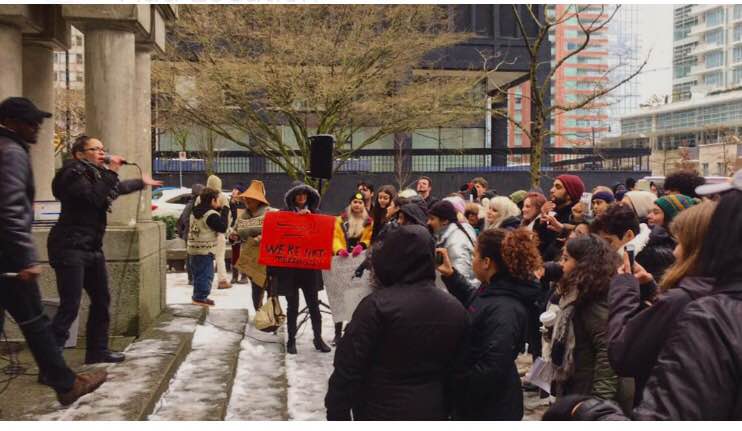No Ban on Stolen Land: the intersectionality of globalization and immigration

This photo was taken on Sunday, February 5th 2017 at the Stand Against the Ban Rally outside of the U.S. Consulate in Downtown Vancouver. The gathering was organized by the UBC Social Justice Center, in response to rising Islamophobia concerns evident in the recent passing of Donald Trump’s travel ban in the U.S. and the subsequent shooting of 6 victims at a mosque in Quebec City (CBC News, 2017). Beside a Musqueam rapper and activist holding a sign that states, “No Ban On Stolen Land,” a red sign reads, “We’re Not Terrorists.” There was a strong turnout of both students and Vancouverites, and numerous activist speakers, poets, and artists with different backgrounds and a need to speak their truths. The energy was both urgent and hopeful, with a running theme of peace and the importance of standing together against a regime that will affect all of in different ways and to varying degrees.
Although citizens of the 6 Muslim-majority countries now prohibited from entering the States are still allowed in Canada, the intersectional “the border crossed us” sentiment captured in this image is applicable to the current events of both countries. This concept that indigenous people did not consent to the acts of bordering emplaced and enforced on their appropriated lands by settler colonial society has brought out a powerful union between groups, in which indigenous communities are reaching out to Muslim immigrants as their siblings in shared experiences of marginalization and displacement. Simultaneously, the protest organizers made clear that the land on which the event was occurring was the occupied, traditional, ancestral, and unceded territories of the Coast Salish people.
Nations themselves are an essentialist social construct, used to control racialized and gendered demographics alienated as ‘other’, separate families and cultures, and profit off of capitalist border and migration tactics in an increasingly global economy (Yu, 2009). Both indigenous people and immigrants have been framed as threats to the white settler nation, while simultaneously being exploited for their resources, land, labor, and watered-down to be consumable parts of their cultures (bell hooks). This creates a paradox in which, although immigrants do play an innate role in settler colonialism through moving to colonized lands, it is as a result of attacks on their homelands from the same white settler nation-states which they are moving to, often in search of better opportunities and quality of life. Canada’s economy relies heavily on resource extraction and agriculture (which destroys indigenous land), with migrant workers kept vulnerable and performing a significant portion of this intensive, dangerous work (Walia, 2010). In this situation, neither indigenous peoples nor migrant workers are benefitting- while Canada as a white settler nation does. If this is Canada’s ‘multicultural and welcoming’ approach, then the United States’ is to explicitly make clear who their nation is welcoming to and who it is not. So while there is a vast population of immigrant workers in the U.S. on whom the economy relies as well, in this case their exploitation is a result of lack of documentation in the first place and strict immigration processes. Disturbing is that in the context of both countries, borders and migration are seen as something to be controlled by solely the white settler nation-state, in ways that will most benefit it, and without addressing how this actually affects indigenous and immigrant livelihoods (Walia, 2010).
This is why intersectionally standing up for immigration rights requires self-reflection and acknowledgement of privilege. At the rally, several speakers made calls for the protection of not just Muslims and immigrants, but for all people of color, queer folks, women, and otherwise ostracized communities. While this is of course valid, as a white queer American-Canadian Jewish woman I have mostly benefitted from the processes of settler colonialism. The Israeli state continues to pursue horrific acts of war against the Palestinian people. Queer movements are all too often wrapped up in homonationalism. White feminism is frequently ignorant of the issues of third world women and trans women. So yes, we must come together to protest injustices, but we must also learn the ways in which our own identities continue to perpetuate these imbalanced systems of power and know when to speak, and when to listen.
References
bell hooks. (1992). Eating the other. Retrieved March 12, 2017 from
https://genius.com/Bell-hooks-eating-the-other-desire-and-resistance-annotated
CBC News. (January 30, 2017). Quebec City mosque shooting victims include businessman,
professor and fathers of young children: 6 men were shot as they gathered for evening prayer, mosque’s vice-president says. Retrieved March 12, 2017 from http://www.cbc.ca/news/canada/montreal/quebec-city-mosque-shooting-victims-1.3958191
Walia, Harsha. (2010). Transient servitude: migrant labour in Canada and the apartheid of citizenship. Sage Journals, 52(1): 71-84.
Yu, Henry. (2009). Global migrants and the new Pacific Canada. International Journal, 64(4): 1011-1026.
